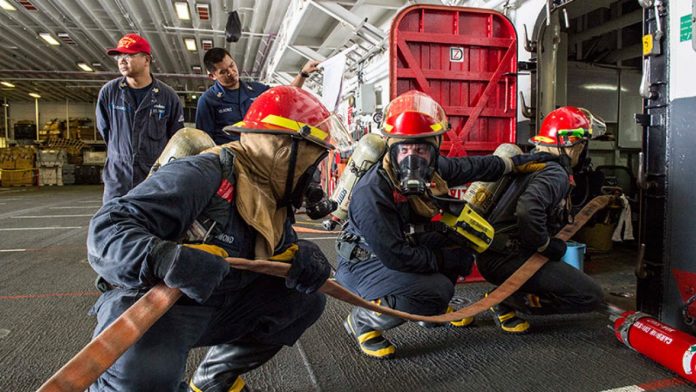This article has been written by Samarth Suri from Symbiosis Law School, Noida and modified by Abanti Bose, from Amity University Kolkata, India. The article briefly discusses the intersection between Human Rights and Maritime Law, basically with the help of various court decisions on the topic, while also relating the same with relevant treaties.
Table of Contents
Introduction
This law comes under the larger domain of international law and is also referred to as the law of the sea. Hence Maritime Law may be defined as a set of conventions, treaties that govern private maritime business.
Most developed nations have separate maritime laws that are different from their national laws. The United Nations through the International Maritime Organization has issued numerous conventions that can be followed by the navies and coast guards of countries. In most developed nations, maritime law follows a separate code and is an independent jurisdiction from national laws. The United Nations (UN), through the International Maritime Organization (IMO), has issued numerous conventions that can be enforced by the navies and coast guards of countries that have signed the treaty outlining these rules. Maritime Law governs many of the insurance claims relating to ships and cargo; civil matters between shipowners, seamen, and passengers; and piracy.
Operation Maritime Law
For understanding how human rights even factor into maritime law it is imperative to first analyse how maritime law operates.
The key to maritime law enforcement is the general principle of the flag state, which provides that vessels under the jurisdiction one flag will follow rules under that flag. Generally, only the flag state has the jurisdiction for law enforcement on such vessels on High seas, although there are some exceptions to this rule. Most of the maritime law work both in consonance with international law and domestic law.
How are human rights classified under Maritime Law
Human rights are extremely fluid in nature and have not been defined anywhere in one place. The first notable regularization of human rights was done in the year 1948 through the UN declaration of Human Rights, to make the provisions of this declaration as binding, two multilateral treaties i.e. the International Covenant on Civil and Political Rights (hereinafter ICCPR) and the International Covenant on Social, Cultural and Economic Rights (hereinafter ICESCR) were formulated. Besides this, there is the United Nations Human Rights Council (hereinafter UNHRC) that oversees the implementation of laws under the Human Rights framework.
Human rights in the context of illicit drug trafficking through High seas
This particular issue was discussed at length in the case of Medvedyev v. France, wherein the European Court of Human Rights established under the European Convention on Human Rights. In this case, the European court of human rights addressed the issue following a French Court’s conviction.
In this, the court had two issues to deal with i.e. the right to liberty and security and promptness. In this case, Medvedev involved crew members that were trafficking drugs, with the intent to supply them to European coasts. The ship, in this case, was under the Cambodian Flag state ship, and upon the request of France, Cambodia has allowed the country to take appropriate actions for its own safety.
Subsequent to this the French coast guard interdicted the ship and seized 100 kilograms of cocaine and detained the crew for their 13 days remaining voyage to France. It was also observed that due to repair and weather conditions, the ship was not able to go at speeds beyond 5 knots.
The French court found 6 of the crew members guilty of smuggling. Subsequent to this the crew members filed a case in the European Court of Human Rights for violation of Article 5(1), 5(3) of ECHR. These articles provide for the liberty and security of all people and the right of the accused to be brought before a judge at the earliest.
In this, the court went against a held norm about the abdication of the jurisdiction of a flag state and held that Cambodia’s diplomatic note did not provide France with the authorization to deprive their liberty. This part of the judgement was held to be rather astonishing and meant that the court dismissed bilateral diplomacy and instead appeared to recognize only treaty level obligations.
Several judges dissented from the opinion of the court in this regard and stated that when there is ample evidence to show that there is a vessel thousands of miles away from the flag state and it is known that such vessel is engaged in Drug Trafficking to which all countries want to put a stop, then deprivation, in that case, would not be against the liberty and the transfer of authority by the flag state to the other state cannot be held as void.
To Article 5(3), the court expressly acknowledged the challenges of on-sea operation. The court took into account the argument of the French government that it is almost impossible to provide a detailed account of every eventuality that takes place at high seas. As to the contention that they should have been shifted in a French vessel to shift them faster, the court held that it is not for the court to determine the feasibility of the operation.
The court narrowly held by a vote of 9-8, that there was no violation of Article 5(3). A dissenting opinion in this regard held that unwillingness to endorse unnecessary abridgements of fundamental human rights in the fight against [drug trafficking]. Such abridgements add nothing to the efficacy of the battle against narcotics but subtract, substantially, from the battle against the diminution of human rights protection. The French government argued that the repair of the ship and other exigencies lead to the delay in time. To this one opinion held that no evidence was adduced before the court that the French authorities had even considered let alone examine other options for bringing them promptly to a judicial officer.
Further in the case of Vassi v. France, where a high seas interdiction of a vessel led to seizing 3.2 tons of Cocaine. The transit from South of Conakry to Brest, France was more than 4000 miles. The French court convicted the accused and sentenced them to 14 years imprisonment.
The court in this accessed whether the 18-day transit of bringing the accused back to France and the subsequent 48 hour lag at the port before bringing them before a judicial officer, was in violation of Article 5(3) of the EHRC.
Regarding the 18 day transit, the court held that there is nothing to suggest that the French authorities took time longer than necessary because the Junior vessel was a vessel that was designed for coastal rather than long distance sailing, however, the 48 hour lag after being brought to the country didn’t have any satisfactory explanation.
The court, therefore, held that in light of the circumstances of the case, France had enough time during the 18 day transit to prepare with foresight, hence there is no justification for the additional 2 day delay. The court continued stating that the purpose of Article 5(3) is to reduce unjustly and ill-treatment of the accused, while also preventing any unjust interference with their liberty, because of this the applicants were awarded EUR 5000.
The European Human Rights Court, in this regard, strikes a balance between Human Rights and Maritime law, by ruling out the application of Article 5(3) for the duration of transit recognizing them are truly exceptional circumstances, whereas reprimanding the delay in bringing such suspects before a Judicial officer once they are at the shore.
Human rights violation under piracy cases
Piracy is one of the major menaces at High Seas. In this regard, Somali pirates have been the most dreaded around the world. An account where Human Rights violations were observed in such cases has been discussed:
In December 2014, a Danish expressed his regret for the arrest of Somali Pirates. The Somali pirates had been detained on a Danish Navy support ship Esbern Snare for 13 days after they were interdicted for their unsuccessful attempt at hijacking a tanker vessel Torm Kansas. Danish law provides that citizens cannot be held in police custody for a period longer than 24 hours, without being presented before a judicial officer.
In this the Danish High Court agreed that their Fundamental legal rights had been violated, this in consonance with video proof stating that those arrested were only fishermen who had lost their gear, made the prosecution drop their case.
In other such cases, the ECHR accepted the intervention of French authorities in Somalian seas on the basis of UN Security Council resolution 1816. However, the court observed that the French law did not include any such provision regarding deprivation of liberty of the accused pending their appearance before the court. In such a case the court observed that Article 5(1) of the ECHR was violated because the legal system in France did not provide sufficient protections for security and liberty of the individual.
Article 6 of the ECHR
Article 6 of the ECHR provides for the right to a fair trial in which the person charged with the offence, among other things has to be given the “free assistance of an interpreter” if he/she cannot understand the language of the country in which he is being prosecuted.
Another human rights issue that comes under the ambit of Article 6 is the prosecution of minors in such courts, where in some cases they are not even old enough to participate in the court proceedings. In 2012 the Indian Navy had announced that 25 of the 62 pirates that they had arrested were below the age of 15. In 2012 a court in Seychelles acquitted an 11 year Somali pirate, taking into account his age and maturity, with the condition that he may be sent back to Somalia.
There is no consensus whether minors should be convicted or not, some commentators arguing that where a child below the age of 15 is considered fit to be fighting then why should be criminally charged.
Another issue concerning human rights violations is that the transfer of the accused to a third state will constitute a violation of International Human Rights. An administrative court in Germany observed this issue and held that it did not breach any international law per se.
Conclusion
International Maritime Law, is a law that is still in the nascent stage of development. The interaction of Maritime Law with Human Rights has been one of the most important aspects of Maritime Law. In this there isn’t any uniform consensus between countries as to what rules should be applied in any particular case, however, laws are used from previous precedents to analyse which treaties are breached in other such cases.
Human Rights in itself is a grey topic, in the sense that more often than not, we cannot expect black and white answers, what might be held as a Human Right violation in one case, may not be in another. Almost all of the Human Rights cases are dealt with circumstantially, as in depending upon the facts of the circumstance.
Hence even when we talk about possible Human Right violations in the application of Maritime Law, it has been seen in the light of the facts and circumstance of the case.
Maritime Law is of even more importance due to the rising international trade and relations between countries. It becomes a pressing issue as some countries have also tried to use this in their favour, by differently interpreting the provision of law. Moreover, Human Rights is a topic that is universal and has to be given its deemed protection irrespective of any other provisions.
References
- https://papers.ssrn.com/sol3/papers.cfm?abstract_id=2820578
- https://injuredcrewmembersrights.com/about-law/19-what-is-maritime-law
LawSikho has created a telegram group for exchanging legal knowledge, referrals and various opportunities. You can click on this link and join:
 Serato DJ Crack 2025Serato DJ PRO Crack
Serato DJ Crack 2025Serato DJ PRO Crack











 Allow notifications
Allow notifications


